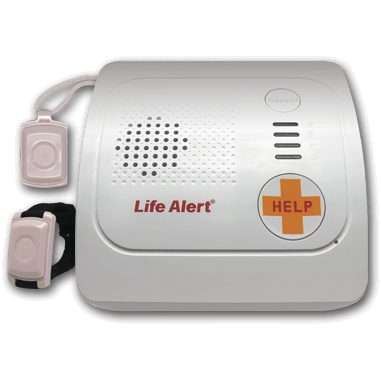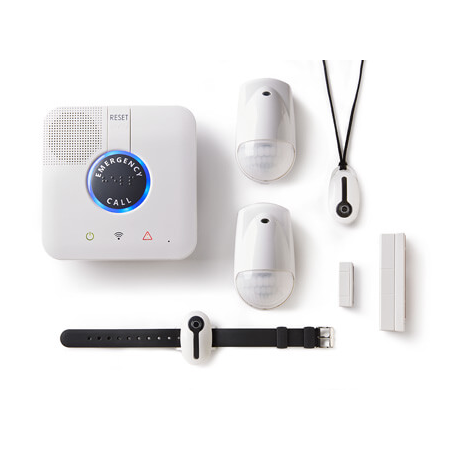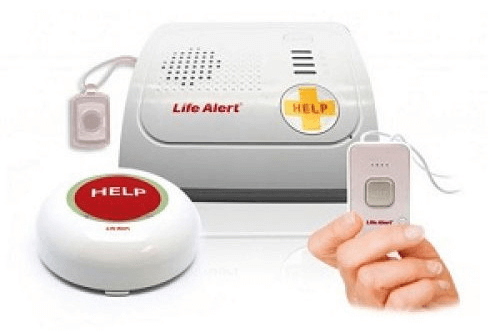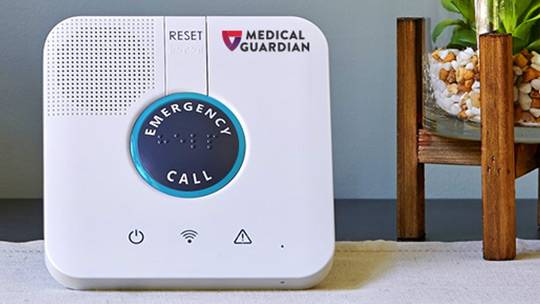Life Alert vs Medical Guardian
We will delve deeper into the features, pricing, and customer service of both Life Alert and Medical Guardian devices, providing a comprehensive comparison to help you make an informed decision.


5.0
Starts at $49 per month
Life Alert


5.0
Starts at $0.97 per day
Medical Guardian
Brio House is an independent review site. We may earn money when you click links inside our site.
Understanding Medical Alert Systems
Medical alert systems are life-saving devices that connect users to a 24/7 monitoring center at the push of a button. These systems come in two main types: at-home systems and on-the-go systems. At-home systems include a base unit that connects to a monitoring center via landline or cellular service, with users wearing a device around the neck or on the wrist. On-the-go medical alert device systems, on the other hand, use cellular networks and GPS tracking to connect users to monitoring center operators wherever they go, eliminating the need for a base unit.
The Importance of Medical Alert Systems
Medical alert systems are crucial for ensuring the safety and independence of individuals, particularly the elderly and those with medical conditions. They provide peace of mind, knowing that help is just a button press away.
One of the most significant features of these best medical alert systems is fall detection, which uses sensors to identify when a user falls and automatically alerts the monitoring center. This feature is particularly important as, according to the Centers for Disease Control and Prevention, around 36 million older adults fall every year, with 3 million being injured seriously enough to need emergency care.
Life Alert and Medical Guardian: An Overview


Life Alert and Medical Guardian are two leading providers of medical alert systems. Both companies offer 24/7 monitoring and are TMA Five Diamond certified, meaning they adhere to random inspections and quality control criteria.
However, they differ in several aspects, including range, battery life, and the availability of fall detection technology. Life Alert’s at-home system has a range of 800 feet, while Medical Guardian’s system boasts a range of 1,400 feet.
In terms of battery life, Life Alert’s on-the-go necklaces can last up to 10 years without needing to be charged, while Medical Guardian’s devices need to be recharged every 1-5 days. Notably, Medical Guardian offers fall detection technology, a feature not available with Life Alert.
In the following sections, we will delve deeper into the features, pricing, and customer service of both Life Alert and Medical Guardian devices, providing a comprehensive comparison to help you make an informed decision.
Life Alert: A Detailed Review

Features and Services
Life Alert is a well-known name in the the medical alert system industry, having been in business since 1987. Their systems are designed to provide peace of mind and safety to users, particularly the elderly and those with medical conditions. Here are some of their key features:
- Emergency Response: Life Alert systems connect users to a U.S. monitoring center that handles over two million calls from subscribers each year.
- Waterproof Devices: Life Alert’s wearable emergency help buttons are waterproof, allowing for use in wet environments like the shower.
- Range: The basic in-home system has a range of 800 feet between the waterproof call button and the base unit.
- Battery Life: The Life Alert Mobile device is an all-in-one medical alert pendant with GPS that includes a non-rechargeable battery that’s rated for up to 10 years.
Pricing Structure
Life Alert’s pricing ranges from $49-$68 per month, with an activation fee of $98-$198 for each new subscriber. It’s important to note that Life Alert requires a three-year service contract that’s difficult to cancel, even if the subscriber is institutionalized or passes away.
Pros and Cons of Life Alert
PROS
CONS
Medical Guardian: A Detailed Review

Features and Services
Medical Guardian is an established medical alert company that offers a wide variety of personal help buttons and systems. Here are some of their key features:
- Variety of Devices: Medical Guardian offers a range of devices from basic in-home landline devices to all-in-one medical smartwatches with GPS locating and SMS messaging capabilities.
- Fall Detection: Fall detection is available on all Medical Guardian systems, providing an extra layer of safety for users.
- Family Guardian Package: This system combines a traditional in-home medical alert base unit with three in-home safety sensors that monitor activity levels. Caregivers can access real-time information from the safety sensors through a secure mobile app or online dashboard.
Pricing Structure
Costs for Medical Guardian systems start at $0.97 per day for the Classic Guardian, while the Family Guardian package costs start at $2.58 per day. To get the lowest possible price and a free PIN-protected lockbox, subscribers need to prepay for either a six or 12-month service package. However, prorated refunds are provided to customers who need to cancel their service.
PROS
CONS
comparing Life Alert vs Medical Guardian
| Company | Device Variety | Fall Detection | Range | Battery Life | Pricing | Customer Service |
|---|---|---|---|---|---|---|
 |
View Packages | No | 800 feet | 10 years on non rechargeable battery | Ranges from $49-$68 per month | Requires a three-year service contract |
 |
View Packages | Yes | 1300 feet | Varies depending on device | Costs start at $0.97 per day for the Classic Guardian | No long-term contracts |
Feature Comparison: Life Alert vs Medical Guardian
When comparing the features of Life Alert and Medical Guardian, there are several key differences to note:
- Device Variety: Medical Guardian offers a wider range of devices, including basic in-home landline devices, all-in-one medical smartwatches with GPS locating and SMS messaging capabilities, and the Family Guardian package that includes three in-home safety sensors. Life Alert, on the other hand, offers a basic in-home system and a mobile device with GPS.
- Fall Detection: Medical Guardian offers fall detection on all its systems, while Life Alert does not offer this feature.
- Range: The range of the basic in-home system of Life Alert is 800 feet, while the range between the Classic and Family Guardian base units and the help buttons of Medical Guardian is 1,300 feet, which is among the best in the industry.
- Battery Life: The Life Alert Mobile device includes a non-rechargeable battery that’s rated for up to 10 years. On the other hand, Medical Guardian’s devices have varying battery lives depending on the specific device.
Pricing Comparison: Life Alert vs Medical Guardian
The pricing structures of Life Alert and Medical Guardian are quite different:
- Life Alert: Pricing ranges from $49-$68 per month, with an activation fee of $98-$198 for each new subscriber. It requires a three-year service contract that’s difficult to cancel.
- Medical Guardian: Costs start at $0.97 per day for the Classic Guardian, while the Family Guardian package costs start at $2.58 per day. To get the lowest possible price and a free PIN-protected lockbox, subscribers need to prepay for either a six or 12-month service package. However, prorated refunds are provided to customers who need to cancel their service.
Customer Service and Reputation: Life Alert vs Medical Guardian
Both Life Alert and Medical Guardian have established reputations in the medical alert industry:
- Life Alert: Life Alert is an established company with over 30 years in the industry. It has an A+ rating with the Better Business Bureau and a five-star rating with Consumer Affairs. However, it requires a three-year service contract that’s difficult to cancel.
- Medical Guardian: Medical Guardian is an established medical alert company with a UL-certified monitoring center located in the United States. It offers no long-term contracts — customers can cancel at any time and receive a prorated refund on any unused service.
Final Verdict: Life Alert vs Medical Guardian
After a detailed comparison of Life Alert and Medical Guardian, it’s clear that both companies offer reliable and comprehensive medical alert systems. However, Medical Guardian stands out due to its wider range of devices, the availability of fall detection, and a more flexible pricing structure. While Life Alert has a longer battery life and a well-established reputation, its lack of fall detection and the requirement of a three-year contract may be deal-breakers for some users.
Recommendations for Different User Needs
For Users Prioritizing Long Battery Life: If you’re looking for a device with a long battery life, Life Alert would be the better choice. Its mobile device includes a non-rechargeable battery that’s rated for up to 10 years.
For Users Needing Fall Detection: If fall detection is a crucial feature for you, Medical Guardian is the clear choice as Life Alert does not offer this feature.
For Users Looking for a Variety of Devices: If you want a range of device options to choose from, Medical Guardian offers a wider variety of devices including in-home landline devices, all-in-one medical smartwatches, and a package that includes in-home safety sensors.
FAQs
Does Life Alert offer fall detection?
No, Life Alert does not offer automatic fall detection, in its devices.
What is the range of the in-home system of Life Alert and Medical Guardian?
The range of the basic in-home system of Life Alert is 800 feet, while the range between the Classic and Family Guardian base units and the help buttons of the Medical Guardian system is 1,300 feet.
What is the battery life of the devices offered by Life Alert and Medical Guardian?
The Life Alert Mobile device includes a non-rechargeable battery that’s rated for up to 10 years. On the other hand, Medical Guardian’s devices have varying battery lives depending on the specific device.
What is the pricing structure of Life Alert and Medical Guardian?
Life Alert’s pricing ranges from $49-$68 per month, with an activation fee of $98-$198 for each new subscriber. It requires a three-year service contract. Medical Guardian’s costs start at $0.97 per day for the Classic Guardian, with prorated refunds provided to customers who need to cancel their service.
Which company offers a wider range of devices?
Medical Guardian offers a wider range of medical alert devices, including basic in-home landline devices, all-in-one medical smartwatches with GPS locating and SMS messaging capabilities, and the Family Guardian package that includes three in-home safety sensors.
What is a medical alert system?
A medical alert system is a device that allows users to call for help in emergencies. They are often used by elderly people or those with serious medical conditions who may need immediate medical attention.
What is automatic fall detection in medical alert systems?
Automatic fall detection is a feature in some medical alert systems that uses sensors to detect when the user falls. When a fall is detected, the system automatically sends an alert to a monitoring center or designated contact.
Who are the leading medical alert providers?
Two of the leading providers in the medical alert industry are Life Alert and Medical Guardian. Both companies offer a variety of devices and services to meet different user needs.
Do medical alert systems offer medication reminders?
Some medical alert providers offer medication reminders as part of their services. This feature can be particularly useful for users who have complex medication schedules.
What is a mobile medical alert device?
A mobile medical alert device is a portable device that allows users to call for help from anywhere, not just their home. These devices often use GPS technology to provide the user’s location to the monitoring center or emergency services.
What are the differences between Medical Guardian and Life Alert?
While both Medical Guardian and Life Alert offer reliable medical alert systems, they differ in several ways. For example, Medical Guardian offers a wider range of devices, fall detection, and a more flexible pricing structure. Life Alert, on the other hand, offers a longer battery life and requires a three-year contract.
How do medical alert companies compare?
Medical alert companies can be compared based on several factors, including the variety of devices they offer, the features of their systems (such as fall detection and GPS tracking), their pricing structures, and their customer service.
How is Medical Guardian different from Life Alert?
Unlike Life Alert, Medical Guardian offers fall detection and does not require a long-term contract. Additionally, Medical Guardian offers a wider range of devices, including a medical smartwatch and a package that includes in-home safety sensors.
